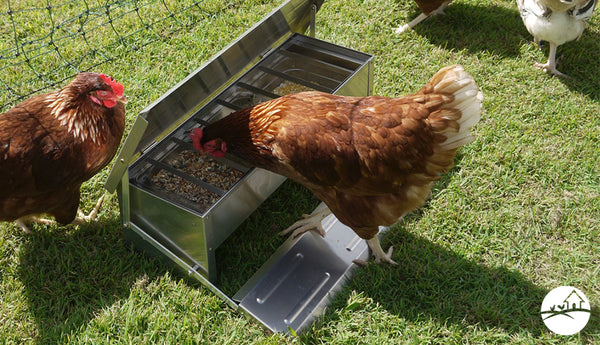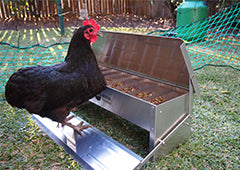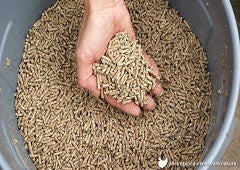Sometimes it can feel like the bag of chicken feed is always half empty. Most chicken feed is reasonably priced but the frustration of wasted feed can be a genuine pain on your mind and your budget. There are of course a number of clever techniques many savvy Chicken Ladies can employ to be sure that they make every morsel and grain of their chicken feed count. Here are 7 sure fire ways to make sure that you and your chickens save a few extra dollars at the checkout.
Chicken feed should live in the right feeder
Many of us have romantic notions of stepping out into our backyard surrounded by rolling hills and scattering chicken feed onto the grass, as the flock pecks and coos at your feet, devouring every morsel of food sweetly. Though this is a very pretty picture of chicken life - it isn't always accurate.
Serving up the chicken feed will be a magical moment you’ll experience every day if you own chickens but please don’t scatter the mixture onto the ground; a spill proof chicken feeder is essential for any aspiring chicken owner. In essence, a treadle chicken feeder is the most cost effective way to allocate your chicken feed to the flock. It is vital for your flock to have chicken feed available to them twenty-four seven, otherwise their health and egg production will suffer and they also might get up to other forms of misbehaviour. Poultry will rarely overindulge on their chicken feed, however, excess chook feed in the coop that is unprotected is more likely to go to waste through spillage, as well as attracting predators and vermin. If you want to know more about the different feeder options, simply head this egg-cellent article here.
Don’t be a mash potato - give your chicks pellets

The mash versus pellet debate has been going on in the poultry community for longer than most of us can care to remember. Both sides have their reasons, however, when the topic purely concerns the prevention of wastefulness - pellets win every time. Pellets are very small and compact rolls of nutrition, which is easily identifiable for both chickens and their owners. The benefits of pellet based chicken feed is that the product is more manageable than mash. Mash is a powdery type chicken feed that is designed to be consumed over a longer period of time. Given it’s texture, mash is more likely to go astray, be blown away or may be rendered inedible if it were to rain. Pellets are more durable and easier to serve up. In the event your cheeky chooks knock a feeder full of pellets over, it’s more likely you’ll be able to salvage the chicken pellets than if they were to knock over a container of mash.
Give your chicks the right kind of treats
There are a lot of common types of kitchen scraps that your chooks will happily lap up if you remember to give it to them. Things like oatmeal, yoghurt, pumpkin, berries and leafy greens will be the perfect treat for your flock. For example, if you have some leftover green salad from a dinner party, instead of throwing it in the bin, consider tossing it into the coop - your chickens will be truly grateful. Not only are you decreasing your own household waste, you are in turn reducing the amount of chicken feed you use. This is all pretty simple stuff but if you are smart, attentive and conscientious, you will find so many small ways to make a big difference when it comes to your chicken feed budget.
Bored chickens will play with their food
Your chooks aren’t birdbrains - they have a lot of energy that you need to carefully redirect, otherwise they’ll get up to more destructive behaviours, like flipping the feeder over, feather picking or scattering their pellets into the wind. There are a lot of ways you can minimise the threat of your chickens acting like bored and destructive divas. Consider getting your girls boredom busters like a chicken swing, making a fruit pinata for them to peck at or even putting a mirror in the cage so they can gaze at themselves all day long. This may seem tangential however if you’re flock is preoccupied they are less likely to get up to mischief, which will only cost you money in the long run.
Mix your leftover feeds together
Many chicken owners sometimes find themselves with leftover containers and bags filled with pullet grower or baby chicken feed and they feel frustrated that it might all go to waste! Don’t worry though, all these chicken feeds designed for chooks at different stages of development can still be fed to most fully grown hens. Ideally it’s best to mix the leftover chicken feed in with the variety that is more suited to their stage of development, for example starter feed mixed in with free range layer feed is perfectly fine. Your chickens will let you know if they aren’t getting enough nutrients by simply ceasing to lay or instead producing malformed egg oddities. In this event, simply return to your normal feeding habits.
Plant chicken friendly herbs and vegetables that they’ll love to eat

If you have enough space in your backyard or property, be sure to plant lots of delicious herbs and vegetables that your free-range chickens will love to munch on. Herbs like basil, coriander and parsley are easy to grow and have abundance of health benefits for your frisky flock. Similarly vegetables like leeks, pumpkins and garlic are rich in vitamins and medicinal properties that will help fortify your chickens immune system. Japanese millet, which is like oats and wheat, is also a great plant to grow, as it has been cultivated for hundreds of years for all kinds of animals to naturally graze upon. Ultimately, growing your own herbs and vegetables is not only more sustainable, it will also help save you money, either on your chicken feed or your weekly food budget. Not to mention all the extra tasty scraps that will become available for your chooks.
Let your ladies free-range!

Now, sometimes it isn't always safe to leave your girls out all day everyday, but free-ranging your chickens is a simple way to save money on chicken feed. How you ask? Well, chickens are some of the best scavengers on the planet! They can find food almost anywhere with very little fuss: bugs, grass, beetles, grit - chickens will eat all sorts of tasty things around your garden. Also, free-ranging is one of the simplest ways to keep your chooks amused, which as I mentioned previously, is an essential part of avoiding any costly and destructive behaviours
There are a whole host of other avenues you can explore when it comes to saving money on chicken feed, such as making your own, buying in bulk and so forth. Ultimately though the best way to ensure that you get the most from your chicken feed is to be conscientious, always use a chicken feeder and be mindful of the tantrums your chickens might throw if they’re bored. Make sure your chicks have plenty of safe room to play, like the Penthouse, Mansion and Mansion Run, otherwise your chicks might start to accidentally peck away at your extra cash.
As well as considering costs, we keepers want to ensure our ladies are getting the most nutritious meals for optimal chicken health. With so many options, this can be stressful and confusing. Many health issues experienced by our girls are due to an imbalanced diet. You might find yourself asking: what to feed, when to feed, how to feed, and why?!
Cluckily, there is no need to be overwhelmed by all the options because our friends at Chickenpedia can help you find out what’s best for your flock at all ages. This is why I recommend their Feeding Pecking Chickens Course to all my readers. Through their course, unearth nutrient rich foods to help your chickens stay healthy, live longer, and produce the best eggs. Keep those yolks nice and yellow! The course shares advice and information on the best food for your flock as well as quantity control, storage, and timing for feeds.
Feeding time is also a great one for entertainment and this course provides bonus content filled with DIY boredom busters, toys, and treats for your flock. Become an eggspert and gain the confidence needed to choose the right chicken feed and know which ones to avoid.
Be sure to click here to visit Chickenpedia today to check out ALL of their amazing courses.

















